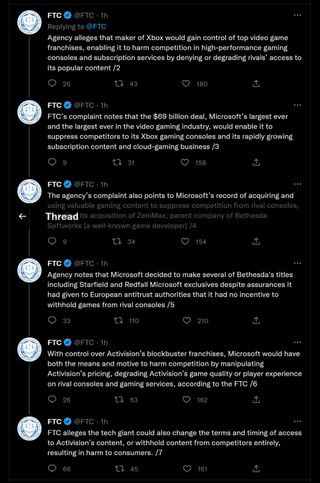Microsoft's acquisition of Activision Blizzard faces roadblock as FTC sues to stop it
The FTC says Microsoft's treatment of Bethesda games demonstrates that it "can and will withhold content" from Sony.

The US Federal Trade Commission has formally moved to halt Microsoft's acquisition of Activision Blizzard, saying that Microsoft has a record of "acquiring and using valuable gaming content to suppress competition from rival consoles."
"Microsoft has already shown that it can and will withhold content from its gaming rivals," FTC Bureau of Competition director Holly Vedova said in today's announcement. "Today we seek to stop Microsoft from gaining control over a leading independent game studio and using it to harm competition in multiple dynamic and fast-growing gaming markets."
A major sticking point in Microsoft's planned acquisition of Activision Blizzard is the Call of Duty series: Sony strongly opposes the deal over concerns that Microsoft will make it exclusive to Xbox consoles in order to draw customers away from PlayStation consoles. Microsoft has repeatedly denied any intention of doing so, and in November made a formal offer to guarantee Call of Duty on PlayStation consoles for at least 10 years.
The FTC was apparently not convinced, however, as it pointed to Microsoft's 2021 acquisition of Bethesda Softworks as evidence of the company's willingness to turn major games into exclusives. It noted in a press release that two of Bethesda's upcoming games, Starfield and Redfall, are both Xbox console exclusives "despite assurances [Microsoft] had given to European antitrust authorities that it had no incentive to withhold games from rival consoles."
The FTC described Activision Blizzard as "one of only a very small number of top video game developers in the world that create and publish high-quality video games for multiple devices," responsible for not just the Call of Duty series but also World of Warcraft, Diablo, and Overwatch. All told, its games account for 154 million monthly active users worldwide, across all devices. But that multiplatform strategy could change if Microsoft takes control of the company, the FTC warned.
"With control over Activision’s blockbuster franchises, Microsoft would have both the means and motive to harm competition by manipulating Activision’s pricing, degrading Activision’s game quality or player experience on rival consoles and gaming services, changing the terms and timing of access to Activision’s content, or withholding content from competitors entirely, resulting in harm to consumers," the FTC said.
To be clear, the FTC's lawsuit does not end the proposed merger: The complaint "marks the beginning of a proceeding in which the allegations will be tried in a formal hearing before an administrative law judge," meaning Microsoft still has an opportunity to argue its case and complete the deal.
The biggest gaming news, reviews and hardware deals
Keep up to date with the most important stories and the best deals, as picked by the PC Gamer team.

In a statement shared on Twitter in response to the FTC lawsuit, Microsoft president Brad Smith said the company "continue[s] to believe that his deal will expand competition and create more opportunities for gamers and game developers."
"We have been committed since day one to addressing competition concerns, including by offering earlier this week proposed concessions to the FTC," Smith said. "While we believe in giving peace a chance, we have complete confidence in our case and welcome the opportunity to present our case in court."
We have been committed since Day One to addressing competition concerns, including by offering earlier this week proposed concessions to the FTC. While we believe in giving peace a chance, we have complete confidence in our case and welcome the opportunity to present it in court.December 8, 2022
The FTC lawsuit comes less than 48 hours after Xbox boss Phil Spencer announced 10-year deals with Nintendo and Steam to keep the Call of Duty series on those platforms, which in light of the FTC's lawsuit now appear more like last-ditch efforts to stave off an FTC response that Microsoft may have known was coming.
It's nice to know that the series will remain on PC, I suppose, but it wasn't ever in doubt: Microsoft hasn't been at odds with Steam since the days of Games for Windows Live, and the FTC pointed out that Microsoft's Xbox consoles "are one of only two types of high-performance videogame consoles." The other, of course, is Sony's PlayStation, and that's what Microsoft is actually competing against—and why games like Starfield are "exclusive" only in the sense that they're excluded from PlayStation.
It's unclear what impact the FTC's action will ultimately have on the deal. According to Axios, the FTC did not file for an injunction against the acquisition, which could signal that the deal is likely to close anyway. It's possible that the action could proceed more quickly through the FTC's administrative court than a federal court, which may have negated the need for an injunction, but it could also be that the FTC expects the deal will ultimately be closed, and is simply registering a for-the-record objection.
In either case, the news of Microsoft's historic purchase of Activision Blizzard meeting some potential difficulty casts a bit of a shadow over the announcements we'll no doubt see from the companies tonight at The Game Awards.
Andy has been gaming on PCs from the very beginning, starting as a youngster with text adventures and primitive action games on a cassette-based TRS80. From there he graduated to the glory days of Sierra Online adventures and Microprose sims, ran a local BBS, learned how to build PCs, and developed a longstanding love of RPGs, immersive sims, and shooters. He began writing videogame news in 2007 for The Escapist and somehow managed to avoid getting fired until 2014, when he joined the storied ranks of PC Gamer. He covers all aspects of the industry, from new game announcements and patch notes to legal disputes, Twitch beefs, esports, and Henry Cavill. Lots of Henry Cavill.
Most Popular







